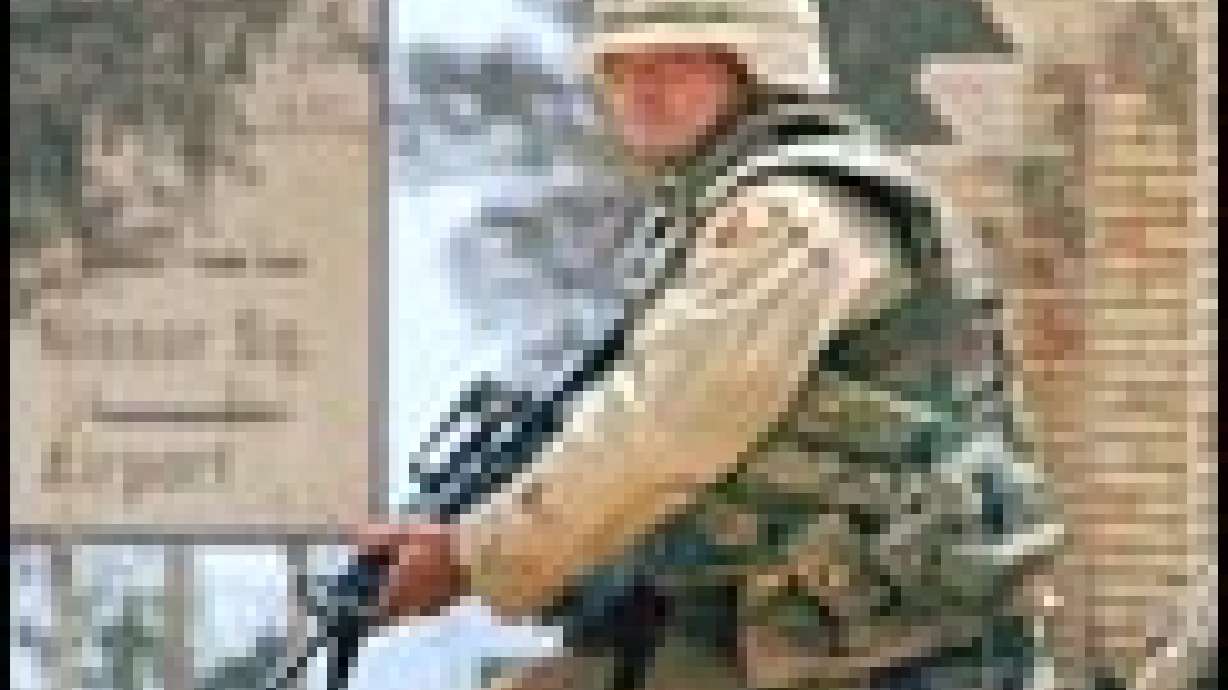Estimated read time: 4-5 minutes
This archived news story is available only for your personal, non-commercial use. Information in the story may be outdated or superseded by additional information. Reading or replaying the story in its archived form does not constitute a republication of the story.
BAGHDAD, Iraq (AP) -- The U.S. military clamped down on unruly western Baghdad on Wednesday, sending hundreds of soldiers to patrol an area where a string of gun and bomb attacks killed one American and wounded several others.
Meanwhile, British Prime Minister Tony Blair arrived in neighboring Kuwait ahead of a visit to British forces serving in southern Iraq.
"I want to see the British troops to thank them for their magnificent performance during the Gulf conflict," Blair told reporters on his chartered aircraft as it flew to Kuwait.
Blair will cross into Iraq on Thursday, the official Kuwait News Agency said. British troops are mostly serving in and around Basra in southern Iraq.
In Iran, President Mohammad Khatami opened a meeting of the foreign ministers of Muslim-majority countries with a call for power to be placed in the hands of Iraqis "as soon as possible."
Khatami did not name the United States, but his government has been sharply critical of the U.S.-led postwar administration of Iraq.
The United States, in turn, suspects Iran of meddling in Iraq through Shiite groups it supports. Tension between the two countries has increased in recent days amid U.S. accusations Iran is harboring al-Qaida terrorists and trying to build nuclear weapons.
U.S. and British occupying forces have been struggling to restore order in Iraq. Eight American soldiers have died and nearly two dozen others been wounded around the country this week.
The U.S. military sweep through western Baghdad began at 3 a.m. and was expected to end Wednesday evening. No details on the operation were available.
On Sunday, one soldier died in an attack in the area, after the Humvee in which he was traveling was hit by explosive placed along a highway. At least five soldiers were injured in the incidents, which included two grenade attacks on a police station, and three highway attacks on moving U.S. military vehicles.
Military officials said they didn't believe all the incidents were connected.
Lt. Clint Mundinger, a U.S. Army intelligence officer, said it appeared that the three highway attacks may have been carried out by the same group, and that the two police station attacks were also staged by the same men -- but that those two groups were probably not connected.
Baghdad remains violent, after dark in particular, though it has become steadily more stable in recent weeks.
Early Wednesday, an Iraqi police officer was hit four times when an assailant opened fire on him from a moving car as he stood near a police station in northwest Baghdad. He was rushed to a Baghdad hospital, and then to a U.S. army medical facility. He was in critical condition, officials said.
On Tuesday, Iraqis opened fire in Fallujah, about 30 miles west of Baghdad, killing two U.S. soldiers. Hours later, two American military police officers were wounded in grenade assaults in Baghdad.
Saddam Hussein had many strong supporters in Fallujah, where protests against the U.S. presence turned violent twice in April, with soldiers firing at crowds, killing 18 Iraqis and wounding at least 78. The United States said people in the crowds fired first, but Iraqis insisted no one shot at the Americans.
Fallujah's 200,000 residents benefited greatly from Saddam's regime, with its young men awarded positions in the elite Republican Guard forces or jobs in government-built factories.
In other developments:
-- The new U.N. envoy to Iraq, Sergio Vieira de Mello, held his first news conference since his appointment. Vieira de Mello said he plans to begin work by Monday and the top of his agenda will be to consult Iraqi leaders and opinion makers "to make sure that the interests of the Iraqi people come first" in rebuilding their country.
-- A report by the Committee to Protect Journalists said an April 8 U.S. attack on a Baghdad hotel that killed two cameramen was avoidable, disputing the Pentagon's claim that the shelling was in response to hostile fire from the hotel. Spanish cameraman Jose Couso, of Telecinco, and Taras Portsyuk, a Ukrainian cameraman for Reuters, were killed in the attack on the Palestine Hotel, where about 100 journalists were staying.
-- A Polish-led peacekeeping force numbering about 7,000 troops from a dozen nations will begin moving into south-central Iraq next months and be fully deployed by the end of August, Polish defense officials said.
-- U.N. nuclear agency inspectors planning to investigate Iraq's largest nuclear complex, at Tuwaitha, will leave a few days later than planned, delaying their departure until next week, a spokeswoman said.
-- The U.S. Treasury Department said it was lifting most remaining sanctions on Iraq, freeing U.S. companies to engage in many normal trade and investment opportunities without first having to obtain government approval. The action followed a U.N. Security Council resolution last week that ended 13 years of sanctions.
(Copyright 2003 by The Associated Press. All Rights Reserved.)









